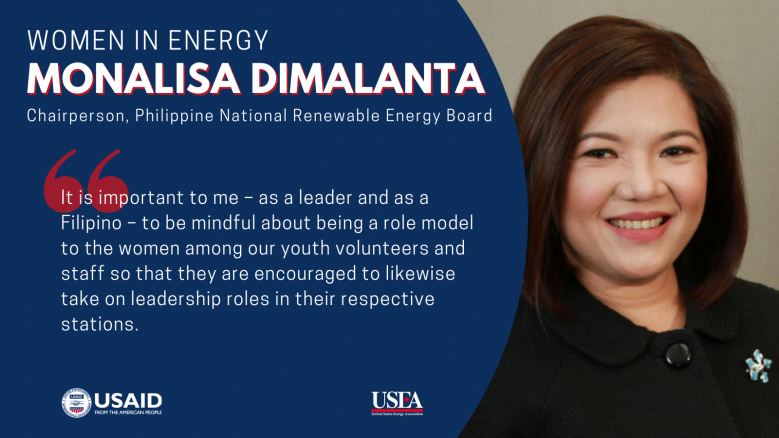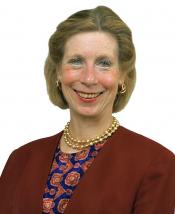
Women In Energy: Barbara Bauman Tyran
The Women in Energy series is a joint project between USEA and USAID that was developed out of USEA’s Engendering Utilities Partnership, a program funded by USAID to improve gender policies and gender outcomes at their respective organizations.

Every month we feature a woman who has shown exemplary leadership. We want to showcase your story this month. The women among you come from diverse backgrounds and roles, and they bring with them a unique perspective to gender equality within the energy sector.

Barbara Tyran brings outstanding federal / state government relations experience, following two decades as Director, Washington & State Relations, in EPRI’s Washington DC office. She was the principal liaison between EPRI executive management, and Congress, the Administration, the national trade associations, state legislators / regulators, and the Washington policy community.
Her background includes federal advocacy for utilities and management consulting for public / private sector clients, with engagements involving strategic planning, policy analysis, marketing, and financial / economic analysis.
Tyran is currently President of the Board of Directors of the Women’s Council on Energy & the Environment (WCEE).
She is also General Chair of the IEEE Power & Energy Society 2021 General Meeting Local Organizing Committee, with over 38,000 members world-wide.
In recognition of her technical expertise and knowledge, she was appointed by the Secretary of Commerce to the Industry Trade Advisory Committee on Energy and Energy Services, advising the Secretary and USTR on international trade matters. She was elected Chair in 2010 and re-elected in 2014.
She holds a BA degree with Honors from Stanford University and an MBA from Yale University.
*USEA does not alter the substance of the responses from the women featured. The answers are their own.
Women in Energy Interview Questions
How have your education and career path led you to where you are now?
"I was fortunate to be in the second class at the newly-launched School of Management at Yale University, whose curriculum focused on developing management skills in the private, public and not-for-profit sectors. This broad educational base provided many options for diverse professional paths.
I began my career in electric utility government relations, there were few professional women. It has been exciting to be a part of the continuing evolution of women in this field and to personally witness the increasing numbers of Congressional and Executive Branch women leaders as well."
Over the course of your career, have you witnessed changes in the sector that have launched more women into leadership positions?
"Absolutely! The proportion of women in energy has increased significantly since I started. When the numbers began to grow, organizations such as the Women's Council on Energy & the Environment (WCEE), were created. WCEE's founding role remains: to foster the personal and professional growth, and leadership capabilities, of its members through substantive programming, networking, and leadership skills development."
Technology is transforming the traditional utility business model into a more modern interactive grid. Some utilities view this transformation as an opportunity to focus on change management and diversity. Research provides compelling evidence that inclusion and diversity unlock innovation and drives better business performance. What, if anything, is your organization doing to attract, retain, and promote more women into senior management positions to respond to the dramatic industry transformation?
"WCEE is a member-driven organization in which diversity is valued and the members are its key resources. Given the pandemic's unprecedented challenges at work and home, WCEE is striving to support its members in achieving their goals despite the uncertainties, including virtual briefings and workshops, executive speakers, career guidance, and job networking. By striving to support the members in their individual needs, WCEE hopes to collectively lift their voices, support their professional aspirations, and provide a virtual space for them to connect to share expertise and experiences."
Are talented women within your organization making it to top leadership positions? Why/why not?
"Every year, WCEE selects and celebrates the success of the 'Woman of the Year' and 'Champion' to recognize the achievements of those awardees. A Gala Dinner is held in their honor to congratulate them and to raise the visibility of top women leaders."
Companies that embrace diversity outperform their competitors. What type of diversity programs does your organization have in place to mentor future women leaders? How does your organization measure and report gender diversity? Is the data publicly available?
"WCEE members span all age and demographic categories, with many now in key leadership positions. WCEE collects membership data continuously and it is assessed on a quinquennial schedule for emerging trends and analysis of the composition. The results are shared in presentations to the membership."
What actions should the energy and electricity sector be focused on to accelerate change, increase diversity, and foster a better gender balance in the boardroom?
"I was honored to serve on a panel, 'Celebrating Centennial of Women's Power', in conjunction with the February 2020 NARUC meeting where we spoke about these issues. The panel -- moderated by NARUC Subcommittee on Supplier and Workforce Diversity Chair Sadzi Oliva -- discussed workforce development, corporate culture, and career aspirations. Public voices accelerate the actions that lead to change. It is a proven fact that increased Board diversity improves organizational profitability."
